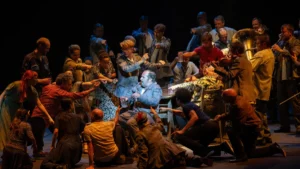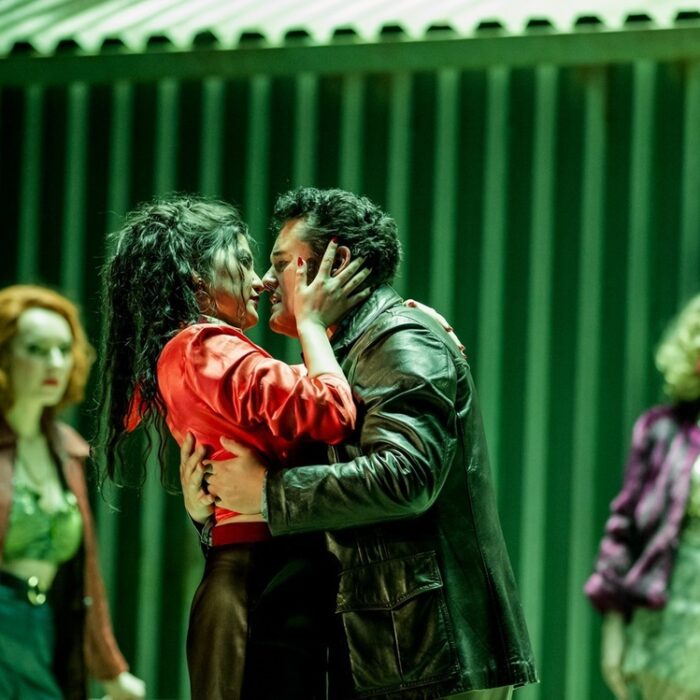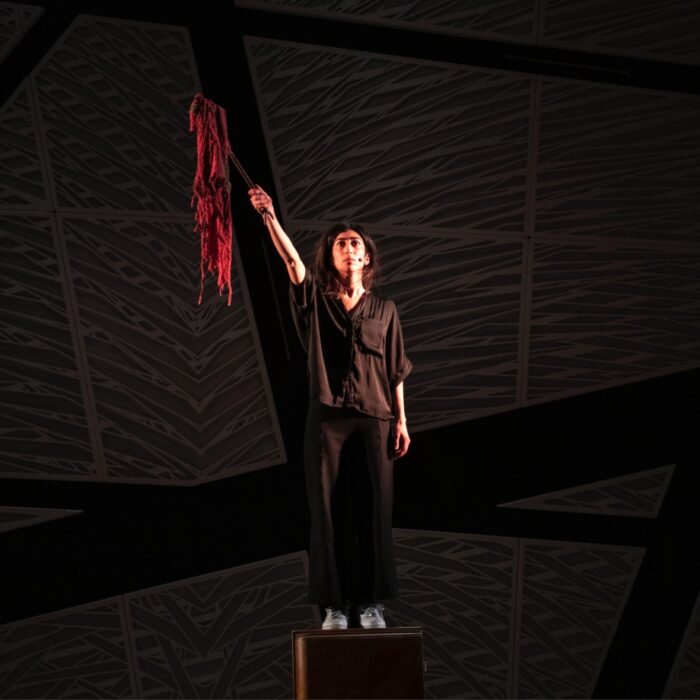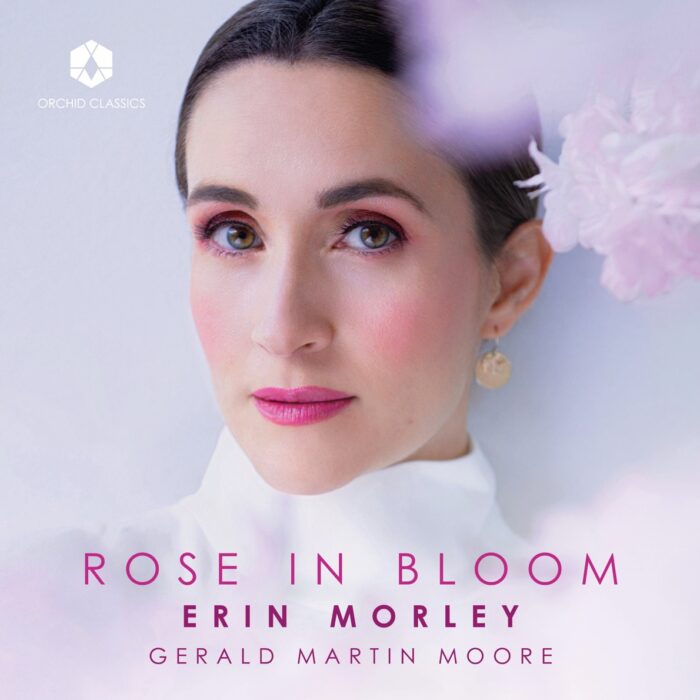
Festival d’Aix-en-Provence 2023 Review: Wozzeck
By João Marcos Copertino(Photo Credit: Monika Rittershaus)
It is a minor cliché to stress how modernist avant la lettre George Büchner’s “Woyzeck” appears to be on a first reading. The play, written by a 22-year-old in 1836, reads today so close to its fellows in the early twentieth century that it seems only logical that the opera would come from the hands of Alban Berg.
What is new in Simon McBurney’s staging is how Berg’s music—and theatrical sense—look so contemporary that it is hard to believe that was written a century ago.
Never Leaving the Stage
Although on the surface a more or less traditional staging, McBurney creates a universe in which all the action emanates from Wozzeck’s mind; therefore he cannot ever leave the stage. It is not a matter of giving Wozzeck more agency—he is still a poor scapegoat—, but rather of establishing his centrality by never allowing the spectator to forget his presence and his suffering. The result is both extremely cinematic—somehow it seemed unnecessary to have entr’actes—and theatrical.
The mesmerizing scenarios, by Miriam Buether, and the choreography, by Leah Hausman, further contributed to the fluidity of performance. The space managed to be both oppressive and intimate. The image of the looming concrete wall swallowing Marie and Wozzeck’s bodies at the end of the opera is indelibly marked on my eyes. The gray concrete became a symbol that marked “Wozzeck” as a modernist opera addressing modernity and its effects on the individual. The production made theater feel pungent and urgent.
If the success of the opera has much to do with its good conceptualization, much of the success of this production has to do with the cast’s comfort acting their roles. All of them were perfectly comfortable with the Sprechgesang—a form of expressionist singing pioneered by Schoenberg. Berg’s vocal lines can sometimes sound like caricatures of a voice, using and abusing both the falsetto in the male voices and the spoken register for all singers. This is part of what makes Berg’s music so particular and, in “Wozzeck,” increases the ridicule directed at characters such as the captain and the doctor. With such a competent cast, it would have been hard to go wrong, but the name of Simon Rattle—whose mere being in the room is already an event— assured a certain level of artistic excellency.
That said, to my ears, musically, not everything was flowers. It might be a matter of personal preference—though I am not alone—, but in face of such atonal music and heavy orchestration, I prefer sounder voices—or what an old-school opera lover would call the Wagnerian type. All the singers were extremely competent and mostly audible, but—and again, in my opinion—Berg’s music sounds especially good with overwhelming voices that make the German text blatantly evident in notes sung to compete with the horns and trumpets. That did not happen in this “Wozzeck”; some singers—even those among them who have sung Wagner—struggled to make their voices heard in the lower notes or in moments that required some tenderness. Maybe it was the cost of such expressive singing, but it was an issue for part of the audience. In the end of the performance, some operagoers were in pure ecstasy—an enthusiastic operagoer behind me shouted “Bravo” so loudly that I fear that I suffered permanent hearing loss—while others seemed not even to applaud the maestro.
Excellent Leads
Christian Gerhaher undertook the hard task of being Wozzeck all the time. In such a staging, Gerhaher had a task similar to a soprano in the role of “Elektra”: he had to be in the spotlight for one hour and 40 minutes with no break. The singer excels in his task, presenting a charismatic and progressively insane tragic hero. His continuous presence made the opera work at a completely different level. His Wozzeck is more humane and sane than usual; his violent acts are almost too justifiable by the end of the opera.
Vocally, his voice has a limpidness that gave the night exceptional moments. His beautiful transitions from singing to speaking with smooth pianissimos, especially in his confrontation with Marie in the third act, were particularly impressive. It is also exceptional to see how Gerhaher was in continuous dialogue with the orchestra, especially when the sounds down the pit were, intentionally, getting more and more uncomfortable to hear.
Also dramatically intense was the performance by soprano Malin Byström. A powerful actress, the Swedish soprano made Marie a strong woman who tries, as much as she can, to hide her obvious fragilities and social precarity. Such talent in acting did not obscure her somewhat imprecise singing and projection, however. The voice suffered from a nervous vibrato and an overall unfocused sound. Her Marie, though extremely strong, was unable to convey the tenderness and lyricism of the opera’s famous first-act lullaby. Her third act, the most dramatic and desperate of the night, had, by far, her best musical moments.
In McBurney’s conception, the figures of the “elite” oppressors are given no features of humanity—they are a caricature of evil that inspire no empathy. Under such direction, the characters of the Doctor and the Captain were played with mastery by Brindley Sherratt and Peter Hoare, respectively. Well acquainted with Berg’s musical ironies, they stressed as much as they could the strangeness of the text, a strangeness that needs to be visible for the play to work. I particularly cannot forget how Hoare sang “from South to North”—stressing the high note on “South” while leaving, with exquisite irony, the low note of “North” almost inaudible. A true sign of a performer unafraid to give himself to the text.
The Drum Major, played by Thomas Blondelle, looked like the ridiculous masculinity that Dean Winters has mastered on TV. In any other circumstances, it would be almost embarrassing to believe that Marie could fall for such a cretin. Vocally, Blondelle actually has a beautiful voice and good projection; in fact, his voice is so nice that I wondered how it would sound performing less horrible characters.
The side characters are all extremely prepared and well-presented. There was no weak link in the performances of them. I particularly enjoyed Héloïse Mas singing the small part of Margaret, and the lyrical relief provided by Robert Lewis as Andres.
Last, but certainly not least, the London Symphony Orchestra under the baton of Rattle was impeccable. Especially in the first act, I could not believe my ears in the high quality of their musical reading. There was an eeriness that really made me rethink some of the implications of Berg’s score. The street fanfare in the first act might have been a bit louder and rustier than usual—a good solution to bring out the sense of exasperation in the play. Simon Rattle seems to be extremely acquainted with the score, and it is sort of emotional, but exciting, to see the orchestra knowing that this is his last run as the LSO’s main conductor: Antonio Pappano will be the orchestra’s chief in the fall.
Quite likely the opera production that is the “talk of the town” this year, Aix-en-Provence’s “Wozzeck” has all the qualities to make it a success throughout Europe and even America. It innovates without sacrificing its appeal to the more conservative operagoer.


